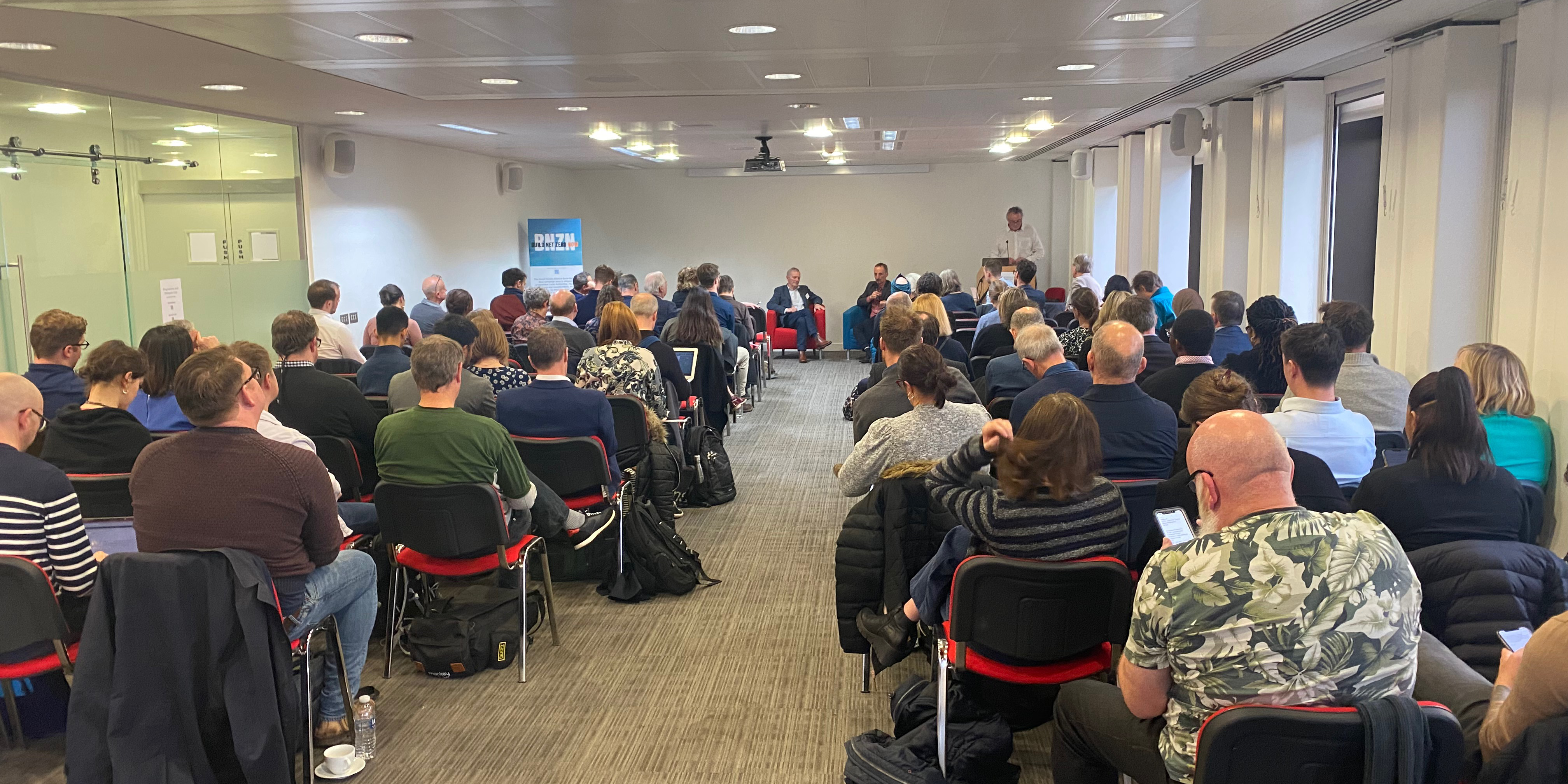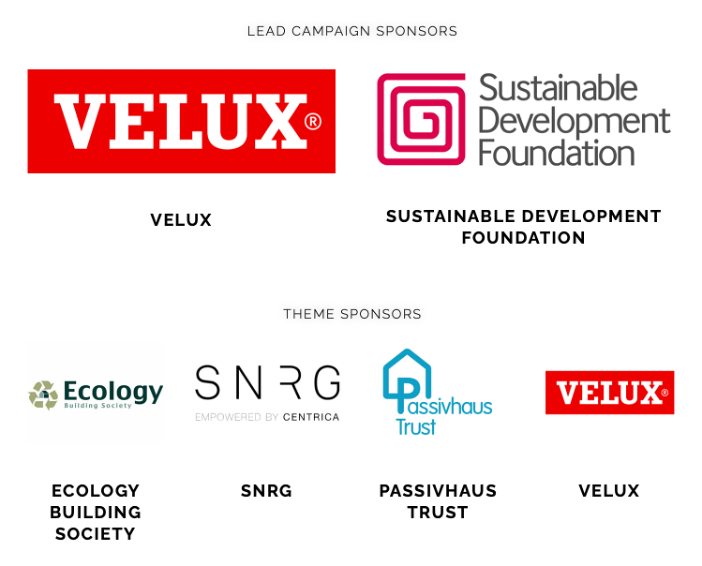Energy provision, health & wellbeing and ambitious net zero planning policy on the agenda at in-person Good Homes Alliance conference

For the first time since a sold-out Net Zero and Future Homes Conference in 2019, the annual 2022 Good Homes Alliance conference took place as an in-person event on Thursday 1st December, kindly hosted by Winckworth Sherwood in London SE1. Over 80 delegates were in attendance from across the sector including local authorities, housing associations, private sector developers, architects, consultants and more.
Net zero has been a consistent theme at GHA conferences, with the 2020 online series ‘A Net Zero Recovery’ focussing on policy, net zero tech, local authority action and health & wellbeing post-Covid 19, with a keynote talk from Baroness Brown, Deputy Chair of the Committee on Climate Change. For the 2021 Build Net Zero NOW Conference Series attendees received an inspirational keynote speech from Julie James MS, Minister for Climate Change at the Welsh Government, and a series of new net zero and low carbon housing case studies were launched.
The 2022 conference was once again held under the ‘Build Net Zero Now’ banner and chaired by GHA Chair Lynne Sullivan OBE, kicking off with an important update on the Future Homes Standard from John Palmer, Deputy Director at DLUHC.
To maximise engagement with the in-person audience, the format for the conference was discussion, debates and networking, with three panels of expert speakers discussing some of the ‘hot topics’ facing the sustainable housing agenda.

Energy supply challenges, grid constraints, electric vehicle infrastructure and smart grid solutions
- Chaired by Mike Roberts, Vice-Chair, Good Homes Alliance
- Neal Coady, Head of Product, SNRG
- Mark Jackson, Head of Commercial Engineering, Active Building Centre
- Simon Anderson, Chief Executive Officer, The Traxis Group
The ‘overheating problem’, best practice solutions and a new shading vernacular for a changing climate
- Chaired by Julian Brooks, Programmes Director, Good Homes Alliance
- Susie Diamond, Founding Partner, Inkling
- Julie Godefroy, Julie Godefroy Sustainability
- Tom Dollard, Partner, Pollard Thomas Edwards
Net zero planning policy and challenges for local authorities and developers
- Chaired by Lynne Sullivan OBE, Chair, Good Homes Alliance
- Thomas Lefevre, Director, Etude Sustainability
- Rafe Bertram, Joint Interim Head of Climate Action and Sustainability, London Borough of Enfield
- Celia Davis, Projects & Policy Manager, Town & Country Planning Association
The afternoon concluded with the ‘Big Net Zero Debate’, bringing together all of the expert panellists for a final discussion. Conference chair Lynne Sullivan posed a question to the audience ‘How can the Good Homes Alliance help overcome these issues and accelerate the delivery of net zero homes?’, with some of the discussion comments from the day summarised below.
- “We must be smart about achieving net zero. Pick off the low hanging fruit first (i.e. fabric efficiency) and focus on quality assurance.”
- “The careful selection of sites could assist in scaling up the building of net zero homes, perhaps even going as far having areas zoned for net zero development.”
- “A massive issue is the lack of systemic training and upskilling for net zero.”
- “Land valuation does generally work against achieving higher performance standards and net zero outcomes. A move towards building under licence where the land value is hidden could achieve better results.”
- “Moving the whole industry forwards via the “level playing field argument” compared to individual progressive local plans demanding net zero is still a live issue.”
- “The embodied impacts of net zero generation, and in particular storage, should be explored further.”
- “The health costs associated with unambitious housing standards that perform poorly , should be factored into the investment argument for net zero homes, i.e. given a health premium.”
- “MMC is only one route to achieve net zero outcomes and there are some concerns around quality.”
- “EPCs urgently need reforming and other financial incentives such as energy performance linked SDLT should be legislated for.”
Next steps
Updated manifesto
Our 2020 manifesto – “Homes Fit for the Future – A ‘Regenerative’ Vision” will be relaunched this year to reflect the growth of our organisation over the last 3 years, particularly via our LA, HA and private developer networks, plus an increased focus on building performance as we welcome Building Performance Network into the GHA.
New guidance on shading and radical water reduction
Building upon our work on overheating, we are close to securing support for the development of new guidance and case studies to explore the challenges facing the housebuilding industry due to a changing climate. We believe there is a need for a change in design approach to make shading solutions the new vernacular for both new and existing homes.
In addition, we are also seeking support to develop new guidance to provide architects, contractors and housebuilders with the knowledge to deliver homes that are radically more water efficient and can help meet ‘water neutrality’.
Call for Sponsors – A New Shading Vernacular for a Changing Climate
Call for Sponsors – Guide to Radical Water Reduction and Reuse in Homes
Cross-sector working groups – Build Net Zero Now campaign 2022-23

Many of the discussion points highlighted above are being tackled as part of the GHA’s Build Net Zero Now campaign working groups which are running through 2022-23 with focusses on net zero energy; best practice planning policy, placemaking & design, and unlocking finance to accelerate net zero development. Outputs will include new guidance, case studies, a database of net zero planning policies, and a ‘mini-manifesto’ on how the finance industry can accelerate the transition to net zero.
The working groups are open to invited experts and 90+ GHA members, including 35+ members in our local authority Vanguard, housing association Pathfinder and private sector Net Zero Developer networks. Collectively the network members represent over 350,000 existing homes and 120,000 new homes to be developed in the next 10 years, many to net zero or low carbon standards.
To find out more about the working groups and to get involved, please contact richard@goodhomes.org.uk.
To join the Good Homes Alliance, visit https://goodhomes.org.uk/join-the-gha.

